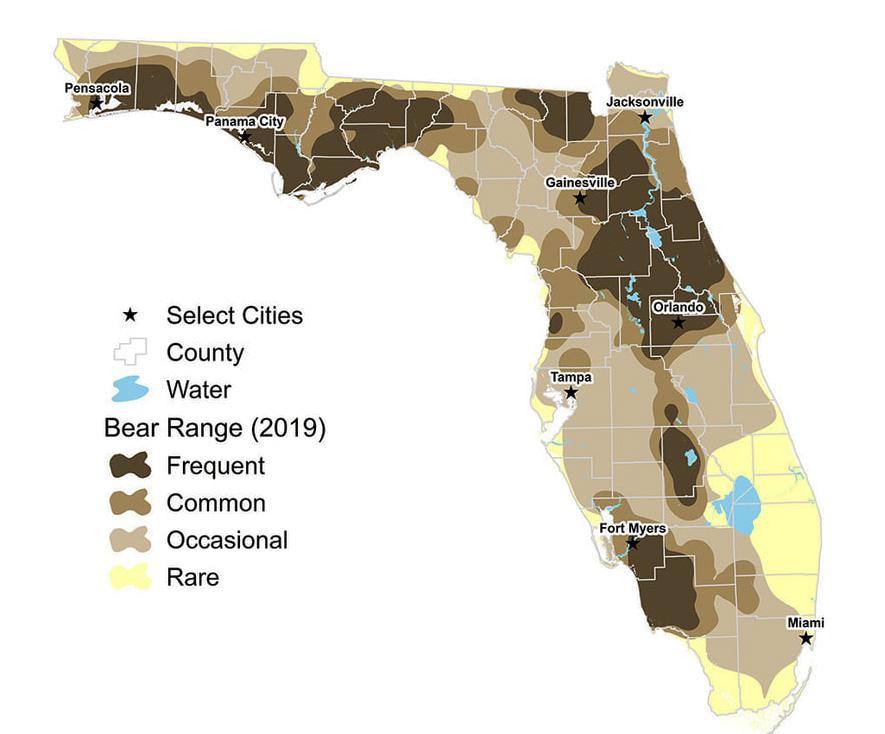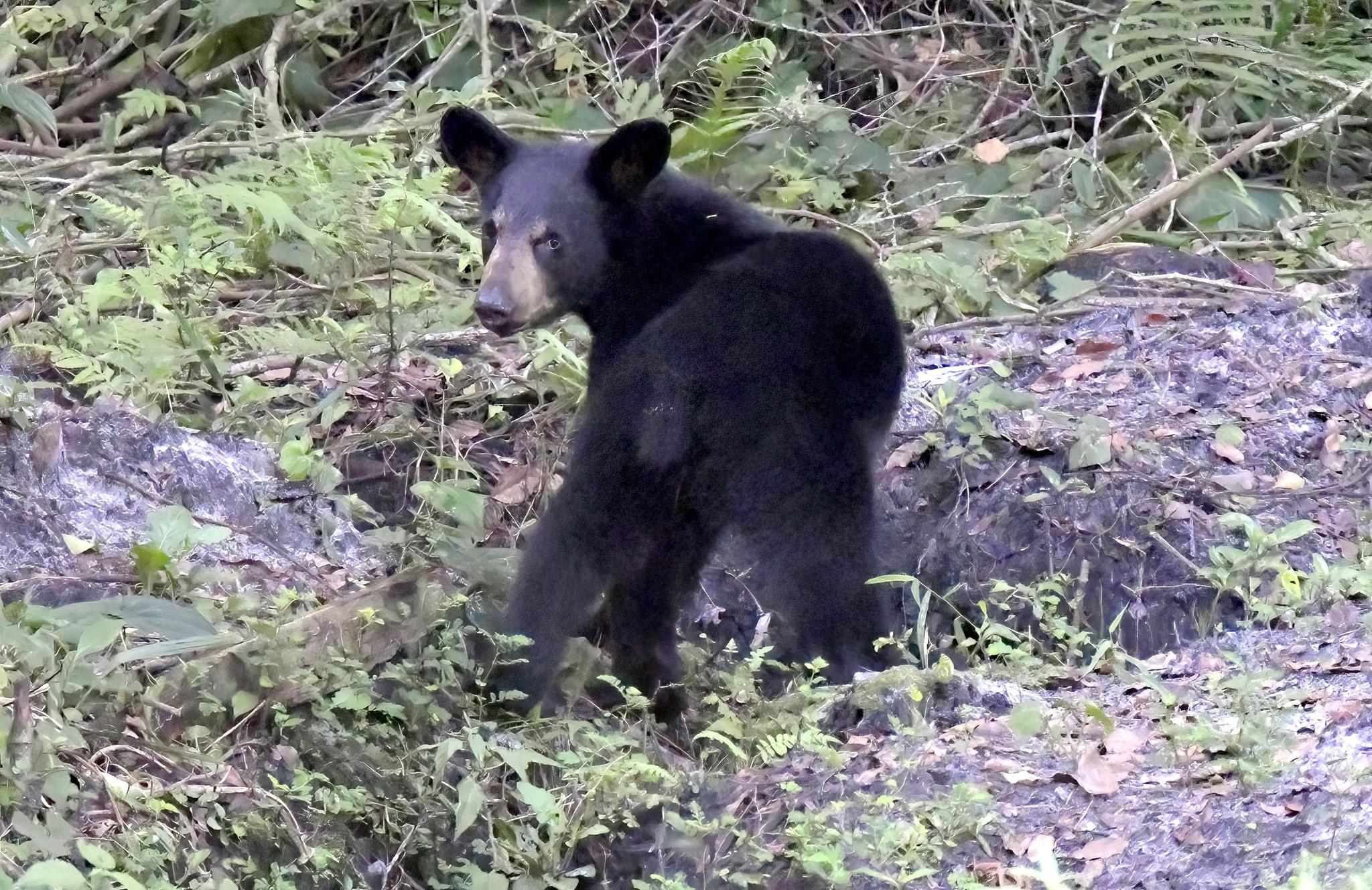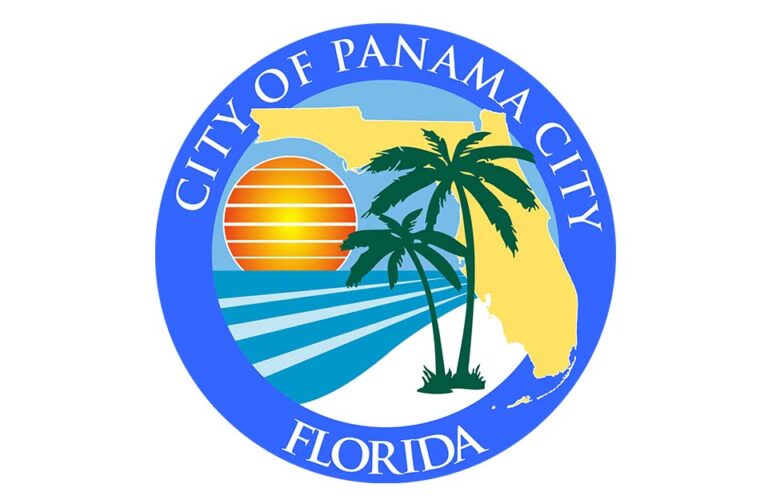Sheriff pokes the bear issue
Sheriff A. J. Smith, who over the past week has called into question how well FWC is managing the problem of bears in the county, has reached out to the governor for help, and it has had an effect.
Smith said he received a call from Roger Young, executive director of the Florida Fish and Wildlife Conservation Commission, not long after the sheriff wrote a Sept. 21 letter to Gov. Ron DeSantis in which he was critical of bear management policy.
Young “will be scheduling a meeting with sheriff’s office staff next week,” Smith wrote on Facebook. “The promising thing about the call was that he promised to have new solutions to this old problem.”
In his letter to DeSantis, Smith referred to a Sept. 3 incident in which a woman was awoken by what she thought was a break-in. “To her utter surprise, panic and guttural fear, it was a large black bear,” he wrote. “She reported that she ran terrified for her safety and locked herself in the bedroom, as the bear destroyed multiple rooms in her home.”
Smith said another incident had occurred Thursday morning, Sept. 21 when a Carrabelle woman reported being chased to her car. “She was able to lock herself in the car but was obviously seriously threatened for her wellbeing,” the sheriff wrote. “Governor, the calls keep coming.”
Smith has made clear, in his Facebook broadcasts, that he points the finger not at FWC officers, but at whom he termed in his letter as “subject matter policy experts to FWC field and operations staff that all have the same ideology, not for the practical use of citizens.”
The sheriff cited to the governor that there were 43 citizen-bear dispatched calls in the last year by his department.
FWC, the law enforcement body responsible for managing the bear population, says it received 130 calls so far this year regarding bears in the county, as of Sept. 20.
“FWC Bear Management staff have been active in this area to help educate and share information with residents on ways to prevent conflicts with bears,” said commission spokeswoman Lisa Thompson.
Smith, in contrast, has been effusive and urgent in its description of the problem.
“There were four bears in a tree over their house,” he said, referring to a situation described in this week’s Lanark News column. “The FWC needs to do their job and come and do something.
“They tell you to shoo them,” Smith said. “Obviously what they’re doing is not working. There needs to be a meeting of the minds, the experts need to take it seriously and do their job.
“‘Here’s a whistle,’ that’s not taking it seriously,” he said. “Law enforcement does take it seriously.”
FWC has avoided further public comment other than providing “some general information about bears this time of year.”
As part of their BearWise program (which has a registered trademark, presumably to brand it as effective bear management), FWC seeks to reach the county population through good advice. Legislative funding for the program, created after the 2015 hunt in part to help counties and cities get residents and businesses bear-proof trash containers, was scrapped after three years.
BearWise outlines steps to reduce human interactions with bears, such as telling people not to feed bears, to clear grills, make trash less accessible, remove bird feeders when bears are active and to not leave pet food outside.
As fall approaches (it began Friday), bears need to pack on fat reserves so they consume more calories, about 20,000 calories a day, and so are in search of food. In comparison, an adult human female maintains her weight at 2,000 calories per day, and a male at 2,500.
‘They are four desperate young cubs’
Jon Johnson, the Forgotten Coast’s go-to guy on wildlife encounters, echoes the FWC science, considers it essential to understand what is happening out in the wild, when considering how to live on good terms with these commanding animals.
“The reason bears are here is to fatten up for the winter on acorns,” he said. “There are some bears, they smell food and it’s an easy quick meal. You don’t want to purposefully feed them. There are also people who don’t want to put their garbage out the morning of garbage collection.”
He goes as far as to say the law should require businesses with Dumpsters to secure them, and that bear-resistant cans should be available, at no cost, to all who need one.
Johnson has sounded incensed by the reaction to the “four orphaned cubs” that have been seen in riotous abandon throughout the county’s east side.
“They were portrayed as just another pack of smaller marauding bears instead of small cubs whose mother was found dead and now are desperately just trying to survive,” he said, pointing out that the bears were not yet weaned from mama, which would not have occurred until 2024.
“Bears have cubs every other year, and cubs like these spend a year and a half with their mother,” Johnson said. “Now they are four desperate young cubs trying to just survive. They don’t know how to get to the state forest or what to eat when they get there. Their mother isn’t there to teach them.”
The FWC is known to relocate nuisance bears to the further reaches of the state’s bear population, closer to Pensacola or Ocala, the number of instances of relocation have not been provided by FWC.

Johnson has been speaking out on behalf of Homosassa Springs Wildlife State Park, which he said takes in orphaned cubs, keeps them long enough to introduce them to the grubs and berries they would normally eat and then releases them in a state or national forest.
“The choice is to send these starving orphaned cubs who are desperately looking for food wherever they can find it to just leave them to a very likely bad ending, or a humane known alternative,” Johnson said.
“The bears have a right to live today, they’re just hungry,” agreed Smith, and stressed he backs relocating the bears. “Put them somewhere they will be safe and people will be safe.”
FWC continues to advise residents that bears will typically not move away from an area if there is easy access to food. “People can make a big difference in helping to prevent conflicts with bears by securing or removing any attractants that will cause bears to linger in a neighborhood,” they caution.
“Seeing a bear in a neighborhood is not necessarily cause for alarm,” FWC said. “If a bear is not able to find food, it will move on. Feeding bears can make them lose their natural fear of people.
“To avoid encounters between a bear or other wildlife and pets, bang on your door and flip your house lights on and off before letting your pets outside. This will give the bear (and any other wildlife) time to leave the area before your pets come outside,” reads the advice. “If you do not have a fenced yard, keep your dog on a short non-retractable leash when taking them outside.”
A return to bear hunting?
FWC, headed by seven commissioners who are appointed by DeSantis, is scheduled to meet Oct. 4 and Oct. 5 in Jensen Beach, but the agenda doesn’t include a discussion on bears.
Earlier this year, commissioners requested staff members present an update on black bears. But without a finalized update, officials confirmed in July a hunt wouldn’t occur this year.
The commission last approved a bear hunt in 2015, the first in more than two decades. The hunt was promoted as slowing an increase of bears in the state and reducing dangerous interactions between bears and humans.
The 2015 hunt was set to last a week in four areas of the state, with 320 bears expected to be killed. Instead, the hunt was called off after two days as the bear death count quickly reached 304.
Smith said better regulations could be approved for any future hunt, with an emphasis on protecting cubs and mothers. “Personally I’m not going out and hunt bears,” he said. “I would be open to it if that’s what it’s going to take, as long as it’s regulated and licensed and done properly.
“This county and the citizens that I serve are being inundated and overrun by the bear population,” Smith wrote in his letter to the governor. “There are senior citizens, mothers with small children, and families with livestock and pets that are afraid to utilize the private and public lands of this county.”
As of 2017, FWC estimated Florida had 4,050 black bears, an estimate that remains on the commission website. Over the past five years, the state has averaged 5,765 calls a year about bears, FWC said. In 2022 there were 5,907 calls, up from 5,738 in 2021.
The FWC encourages residents and others in the community to contact the FWC’s Northwest Regional Office at 850-265-3676, the office of Cheryl Spencer, to speak with staff about specifics of any and all bear encounters.
Jim Turner of The News Service contributed to this article.







The bear problem is the result of death threats and similar nonsense from the “Humane Society” to the FWC commissioners who are too cowardly to stand up to this outfit and the rest of the tree huggers that support these tactics. Send the 4 cubs and any other trapped bears to HSUS to handle.
I had a lot, on a lake & real close to the beach. All went well, until my wife saw an alligator in the water. She never wanted to build on it, after that. It was fairly close to Carrabelle. I enjoy seeing the wildlife, including the bears & the gators but, I’ve never had any kind of threatening encounter. Snakes are another species that I generally have no problem with. Coyotes, on the other hand are a species I could live without.
Sadly, panic has set in to the local sheriff there. You must think rationally when dealing with wildlife. Remember, you’ve encroached upon their territory and habitat first. Black Bears are very docile and are usually more frightened by humans than we are of them. There are rare instances where a Black Bear has attacked a human but not without being provoked first. If someone gets in between mama and cubs, that’s when you need to worry. Sheriff, if you have an issue, report it to the right people but let them handle the solutions to the problem. Showboating on Facebook only makes you look unintelligent on the issue.
I have had a few encounters with a few wildlife animals since moving to the emeral cost. Fox,snakes, feral hogs,baby bear cubs and a massive Bear. all which was in my yard. None ever tried to harm me. I gave them the space to go their way. They are God’s creatures and if we would quit tearing down the forest and woods they call home,we wouldn’t have these problems.we caused their problem,so we need to fix it.Stop crying kill them. They have the right to live also.